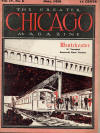 The Greater Chicago Magazine, June 1929
The Greater Chicago Magazine, June 1929www.FranzosenbuschHeritageProject.org Home
 The Greater Chicago Magazine, June 1929
The Greater Chicago Magazine, June 1929
Page 16
Novotny Promotes Use of Concrete Pipe
Frank Novotny, President of the Illinois Concrete Sales Company has been connected with the concrete sewer pipe industry since May, 1924, when he severed his connections as President of the Federal Paving Company, and entered .the employ of the independent Concrete Pipe Company of Indianapolis as Sales Manager of the Chicago district. Up to his appointment very little, if any, reinforced concrete sewer pipe was being specified in this territory, but through his efforts and connections he has successfully introduced reinforced concrete pipe for sewers, not only in the territory in and around Chicago, but throughout the State of Illinois.
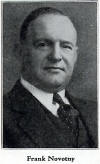 The
Independent Concrete Pipe Company, manufacturers of reinforced concrete pipe in
sizes from twenty four to one hundred eight inches in diameter, has furnished
over eighty per cent of all reinforced concrete pipe manufactured and used in
and around Chicago since 1924. From figures available over six million dollars
worth of reinforced concrete pipe has been used in this territory, and this does
not take into account the rest of the State of Illinois, where another million
and a half dollars worth has been used.
The
Independent Concrete Pipe Company, manufacturers of reinforced concrete pipe in
sizes from twenty four to one hundred eight inches in diameter, has furnished
over eighty per cent of all reinforced concrete pipe manufactured and used in
and around Chicago since 1924. From figures available over six million dollars
worth of reinforced concrete pipe has been used in this territory, and this does
not take into account the rest of the State of Illinois, where another million
and a half dollars worth has been used.
Mr. Novotny is also Secretary and Treasurer of the Mid-West Concrete Pipe Company, and their General Sales Manager. This concern was organized in 1926 by Mr. Howard Schurmann, President of the Independent Concrete Pipe Company, Mr. C. H. Bullen, now President of the Mid-West Concrete Pipe Company, and Mr. Novotny, to manufacture machine-made pipe in sizes from four to forty two inches in diameter, either reinforced or plain, that is without reinforcing steel. A most modern plant was built at Franklin Park, Illinois on a site comprising some eight acres of ground, and machines of the "Bullen Process", that is the tamping type of machines to make small pipe, were installed.
The enormous success of the Mid-West Concrete Pipe Company is evidenced by the fact that small concrete pipe has been used in some of the largest sewer projects around Chicago such as River Forest, Stickney, Calumet City, Lansing, Franklin Park, Park Ridge, Dolton, Tessville, Arlington Heights and many others too numerous to mention.
Small concrete pipe is not only being specified in other projects in the latter towns, but in many other cities and villages, and there is no doubt but that this year will see the use of small concrete pipe to a much greater extent. In other words, concrete pipe, whether it is in the small or large sizes, plain or reinforced, has been used, proven its worth, and is now considered to be the most up to date material for use in the construction of sewers, culvert or water lines.
The village of Westchester has used a considerable amount of large and small reinforced concrete pipe in the development of their Sanitary and Sewage System pipe for which was installed by the L. E. Meyers Company. The large pipe was manufactured on the ground by the Independent Concrete Pipe Company of Indianapolis and the small pipe was delivered from the plant of the Mid-West Concrete Pipe Company at Franklin Park, Illinois.
A suite of offices of the Illinois Concrete Sales Company, Independent Concrete Pipe Company, and the Mid-West Concrete Pipe Company is located in Rooms 1213-1214 & 1215, City Hall Square Building, 139 N. Clark Street.
Black Picks Westchester for Real Estate Investments
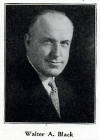 Walter
A. Black, president of the W. A. Black Company, has watched with interest the
growth of Greater Chicago with the thought in mind of investing in real estate
and decided that Westchester is the best place for quick and sure advancement in
values. Consequently, he has purchased some of the best sites available in
Westchester and will continue to take over more from time to time. He has also
purchased a residence lot and will build a home there in the very near future.
Walter
A. Black, president of the W. A. Black Company, has watched with interest the
growth of Greater Chicago with the thought in mind of investing in real estate
and decided that Westchester is the best place for quick and sure advancement in
values. Consequently, he has purchased some of the best sites available in
Westchester and will continue to take over more from time to time. He has also
purchased a residence lot and will build a home there in the very near future.
The W. A. Black Company is now doing the work of submerging the Chicago and Westchester Electric Railroad at Roosevelt Road and also the elevation and paving there. They have been in the business of paving and excavating and railroad construction in and 'round Chicago for several years, and are considered second to none in their line of business.
Mr. Walter A. Black, one of Illinois' largest contractors, has had rather an interesting career. Beginning at the bottom several years ago and steadily climbing to the top he has reached the goal he set for himself -- and is now a leader in the paving business. There is little about road building that he does not know, and when one stops to consider the number of years he has worked at it, it is not surprising that he has built up an exceedingly nice business as well as an enviable reputation among contractors.
Mr. Black has surrounded himself with an organization of loyal capable and efficient superintendents, foremen and workmen who are carrying out his desire of doing only the best work. He and all of his organization are very proud of their reputation.
One Firm Lays Forty Miles of Sidewalk in Westchester
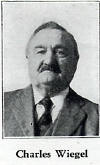
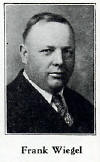 Forty
Miles of sidewalk construction in Westchester is the contribution of Charles
Wiegel and Company to the gigantic Westchester improvement program that is
making this suburban development movement the talk of suburban Chicago. For
twenty years back Charles Wiegel and Company have done the sidewalk construction
and Cement work for the
William Zelosky Company.
Forty
Miles of sidewalk construction in Westchester is the contribution of Charles
Wiegel and Company to the gigantic Westchester improvement program that is
making this suburban development movement the talk of suburban Chicago. For
twenty years back Charles Wiegel and Company have done the sidewalk construction
and Cement work for the
William Zelosky Company.
To take care of the immense program of work a large force of men are constantly employed, under the direction and close supervision of Frank Wiegel, superintendent of construction. Frank is the son of Charles Wiegel, and one of the leading men in Chicago in cement construction work. The yards are at 4142-44 N. Western Ave. and offices of the company are at North Claremont and Berteau Avenues. Mr. Frank Wiegel is prominently identified with the Northcenter Lions club and is a member of the A. F. & A. M. and of the Northern Athletic Club.
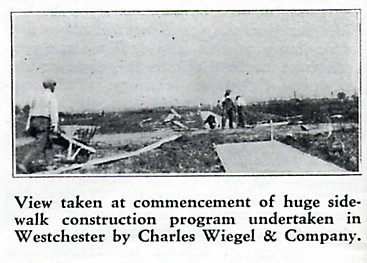
Page 17
Myers Company Installs $1,500,000 Sewer System
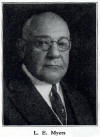 Any
community development on a scale as large as Westchester's would necessarily
require the services of huge organizations able to cope with the extraordinary
demands of the situation. Accordingly when the problem of installing some of the
great public improvements in the village came up, the L. E. Myers Company was
given a contract for the work.
Any
community development on a scale as large as Westchester's would necessarily
require the services of huge organizations able to cope with the extraordinary
demands of the situation. Accordingly when the problem of installing some of the
great public improvements in the village came up, the L. E. Myers Company was
given a contract for the work.
This famous old Chicago concern has distinguished itself since 1889 in a succession of real feats of community building. Niles Center is one of the noted places which saw this company active in its upbuilding. As railroad builders and creators of great public utility systems, the L. E. Myers organization has earned a great and enduring reputation.
Their work in Westchester has been notable. The village, comprising an area of 2,200 acres, hurriedly deciding to become a city capable of caring for one hundred thousand inhabitants, was faced with the problem of widening its main or principal streets. The new plan called for main streets at least 100 feet wide and residence streets 66 feet.
Before these wider streets could be built, however, water mains and storm and sanitary sewers had to be constructed and but twelve month's time was allotted for the completion of this tremendous improvement program which had to precede the actual building of the city itself.
Addison Creek had to be deepened, widened and straightened. At certain points of operations its banks had to be blanketed with slabs of reinforced concrete and finally a concrete bridge had to be built.
To carry off the storm waters of Westchester, the L. E. Myers Company had to construct 28.2 miles of storm sewers. These were laid to discharge into the sanitary district intercepting sewer through an automatic lift station. This prevents any possibility of back water flooding Westchester basements, when the intercepting sewer is surcharged with heavy rains.
A sanitary sewer system 24.4 miles long was built. Water was supplied to the village of Westchester by 34.7 miles of water lines laid from Austin Boulevard. Chicago.
Water storage was provided by a 500,000 gallon covered concrete reservoir. A high lift pumping station and a 100,000 gallon elevated steel tank furnished pressure for the distribution of water throughout Westchester.
It will be realized that this extensive program called for real engineering and constructing ability. The L. E. Myers Company met the test with credit. All the sewers and the water system had to be ready for use within 12 months from the time work was started. The work had to be carried on so as to allow the paving to progress. Added to this fact was the trouble encountered crossing peat beds and burrowing through quicksand. This condition necessitated specially designed pile driven trestles capable of supporting the storm and sanitary sewers until drainage enabled the conditions to become settled.
All in all the foregoing problems demanded a contracting company that not only knew what to do and how to do it but which had access to the necessary special and regular construction equipment. Thus it was that the L. E. Myers Company was called into consultation, erected its big labor camp for 300 men and performed the great job by working its forces on night and day shifts.
The complete cost of this work was $1,580,896.
Proviso State Bank Serves Busy Westchester
 The
recent tremendous development which has taken place in Westchester has been
materially aided by that notable financial institution, the Proviso State Bank,
of Maywood. Every community undergoing rapid growth requires the services of a
strong, progressive banking house and this need has been adequately supplied by
the Proviso State Bank which has been doing business in Maywood since 1913.
The
recent tremendous development which has taken place in Westchester has been
materially aided by that notable financial institution, the Proviso State Bank,
of Maywood. Every community undergoing rapid growth requires the services of a
strong, progressive banking house and this need has been adequately supplied by
the Proviso State Bank which has been doing business in Maywood since 1913.
Westchester in particular, with millions of dollars changing hands in the process of upbuilding the village, could not get along without the accommodations afforded by the Proviso State Bank. After all the only way to make money is to render a service to the public -- to supply something that people want -- and this able bank has been eminently successful in doing just this thing for the people of Westchester. It is the official depository' for the funds of the village of Westchester and many of the large financial transactions made during the recent development of the village have been through this institution.
A condensed report of the bank's standing recently made to the Auditor of Public Accounts at Springfield shows the excellent condition enjoyed by this busy bank. Its present total resources amount to one million, two hundred and sixty thousand, one hundred and fifty-eight dollars.
Any business man knows that a strong, friendly bank is indispensable to the success of any undertaking of any size or importance and it is the especial province of the Proviso State Bank to promote the financial welfare and business advancement of the citizens whose community it serves. They are invited to avail themselves of the opportunity of being served by a banking institution that has prospered for many years by giving real banking service to its clients and depositors. As that shrewd old veteran of finance, Mayer A. Rothschild, once said: "It takes a great deal of boldness, mixed with a vast deal of caution, to acquire a large amount of money; but then it takes ten times as much wit to keep it after you have got it as it took to make it." The Proviso State Bank has been successful in a dual way; it not only takes care of one's money, it helps one to make more!
The officers of the bank are: G. A. Hart, Chairman; A. J. Busscher, President; A. W. Holden, Vice-President; I. G. Baumann, Cashier and Erma C. Crosby, Ass't Cashier. The directors are: J. W. Dixon, C. J. Nelson, Ben P. Lindberg, W. F. Boeger, Dr. L. B. Joslyn, E. V. Swangren, W. G. Heidemann, C. Vandenbroucke, A. W. Holden, G. A. Hart and A. J. Busscher.
Last Modified: 10/04/2002